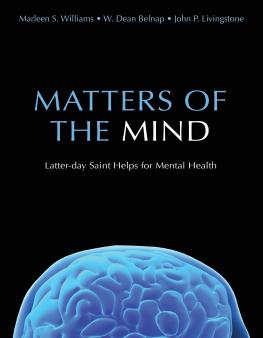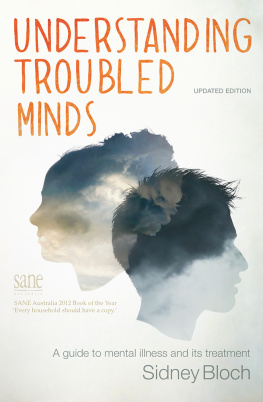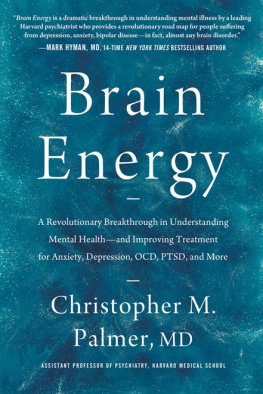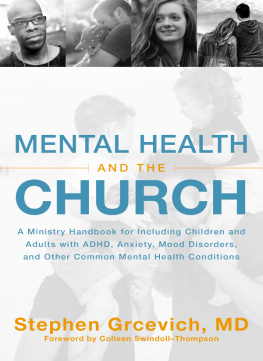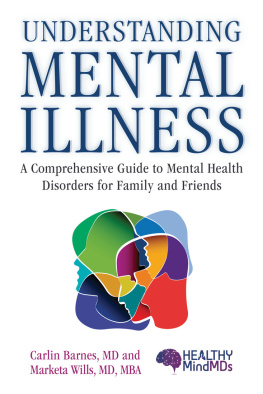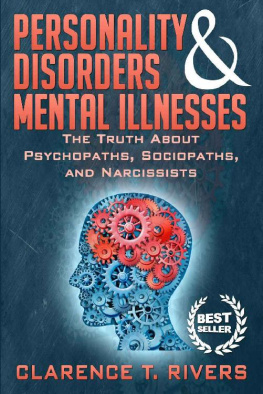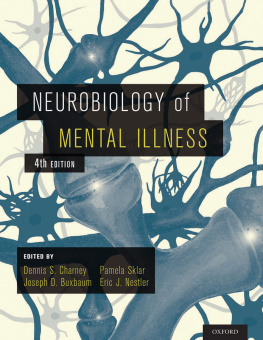Matters of the Mind
Latter-day Saint Helps for Mental Illness
Marlene S. Williams, W. Dean Belnap, John P. Livingston
2008 Marlene S. Williams, W. Dean Belnap, John P. Livingston.
All rights reserved. No part of this book may be reproduced in any form or by any means without permission in writing from the publisher, Deseret Book Company (permissions@deseretbook.com), P.O. Box 30178, Salt Lake City Utah 84130. This work is not an official publication of The Church of Jesus Christ of Latter-day Saints. The views expressed herein are the responsibility of the author and do not necessarily represent the position of the Church or of Deseret Book. Deseret Book is a registered trademark of Deseret Book Company.
Library of Congress Cataloging-in-Publication Data
Matters of the mind : Latter-day Saint helps for mental health / edited
by Marleen S. Williams, W. Dean Belnap, and John P. Livingstone.
p. cm.
Includes bibliographical references and index.
ISBN 978-1-59038-870-9 (paperbound)
1. MormonsMental health. 2. Mental illnessReligious
aspectsMormons. 3. Mental illnessReligious aspectsChristianity.
4. Mentally illReligious life. I. Williams, Marleen. II. Belnap, W.
Dean (Wilford Dean), 1926 III. Livingstone, John P.
RC455.4.R4M38 2008
616.89dc22 2008008696
Printed in the United States of America
Sheridan Books, Chelsea, MI
10 9 8 7 6 5 4 3 2 1
Acknowledgments
Acknowledgments
We thank our spouses, Robert Williams, Mary Elen Belnap, and Linda Livingstone, for their constant support, encouragement, and help with this book. We also thank our research assistants, Anna Cariello and Brooke Burdge, for their careful scholarship and research. Community members and leaders, family members of individuals with mental illness, and those who experience these illnesses contributed to focus groups that helped us to generate topics for the book. Their input was very helpful. We appreciate the dedicated professionals who contributed chapters. Their expertise and commitment to improving the lives of others has made this book possible.
Introduction
How This Book Can Help You
This book was written to give you a more accurate understanding of mental illnesses. The information it contains will give you a greater knowledge of the difficulties experienced by those who have mental illnesses and teach you how to respond with compassion and empathy. If you are experiencing mental illness, this book can help you understand your own illness and be more compassionate and patient with yourself. You will also learn ways to help yourself manage and recover from the illness.
The chapters in this book will inform you about the causes of many mental illnesses. You will find ideas for managing brain problems, as well as ideas for reducing stress which can make them worse. You will learn how to strengthen spiritual, social, and emotional skills that will help you cope. You will also learn about how mental illnesses can be treated and where to find competent help.
Many of the symptoms of mental illness may resemble normal human experiences. It is important that a professional who has been trained to recognize mental illnesses make an accurate diagnosis. This book is not intended to train you how to diagnose mental illnesses. It can help you, however, recognize when a person may be experiencing a mental illness and know when and how to seek professional help. Early, appropriate treatment can reduce much suffering for both those who suffer from mental illness and those who love them.
The names used in case illustrations are fictional, but the facts represent examples of typical mental health problems. Any resemblance to real individuals, living or dead, is purely coincidental.
Section I
Understanding Mental Illness
What Is Mental Illness?
An accurate understanding of mental illness can help reduce the suffering that is caused by mental illness. Both those who suffer from mental illness and those who love them suffer much more when others do not understand mental illness. For many people, the term mental illness brings to mind strange and frightening images, such as those often portrayed in film and other media. These dramatic portrayals may be the only information many people have about mental illnesses. Historically, people with mental illnesses have often been scorned, blamed, banished from society, imprisoned, and mistreated. Many people still believe that mental illness is a rare problem that happens to other people and their families. They may believe that if they are good and do what is right, they can never be affected by mental illness.
Many individuals and their families who suffer from the effects of mental illness are faithful, religious people who try to do the best they can to keep Gods commandments. Just as other medical diseases and disorders can afflict those who keep commandments and live righteous lives, mental illnesses can strike any person.
In these latter days we have been blessed by new discoveries that have improved our understanding of the causes and treatments of many serious diseases. Science has made advances in our understanding of viruses, genetics, body functions, and many other fields. These have improved our health and given us a longer life expectancy.
The brain is an organ of the body and, like other organs, is subject to disease and malfunction. Until recently, however, it has been difficult to explore how our brain affects thoughts, moods, behaviors, and our ability to understand and interpret information from the five senses. Science has made great progress in the past twenty-five years. Neuroimaging allows us to watch the brain as it works, discover what is happening when it does not work properly, and explore ways of correcting problems. There is still much we do not know, but these scientific advances have given us a much better understanding of what mental illness is and what it is not.
The term mental illness refers to many different kinds of mental problems. Most of these problems are related to difficulties in the brains ability to function properly. Some of these disorders are easy to recognize as being related to problems in the brain. When a person has a stroke and loses the ability to speak, it is usually easy to see the connection between the medical problem and the difficulty in speaking. However, the brain performs many other complex functions. It organizes thoughts, experiences and interprets emotions, pays attention to some things while tuning out others, plans behaviors and activities, and processes and makes sense of information that enters the brain through the five senses. It may be difficult, however, for the casual observer to see the connection between what happens when the brain cannot function properly and what we call mental illnesses. This book can help you better understand how these brain problems can contribute to mental problems.
Recognizing Mental Illnesses
It is important to recognize mental illnesses and know how they differ from the everyday challenges we all face. People without mental illnesses may temporarily experience many problems that are similar to mental illnesses. When the brain is working properly, however, we have more resources for helping ourselves through the challenges of mortal life. This makes it much easier to change a bad mood, cheer up, solve our problems, or just carry on through difficult experiences. Psychological and spiritual resources are usually sufficient to manage normal problems. These normal challenges, however, are not as severe, disabling, or chronic as those experienced by people with mental illnesses. There are changes in how the brain works when a person has a mental illness. These changes reduce many of the resources that we normally use in the brain to overcome lifes challenges. People with mental illnesses cannot simply will themselves to snap out of it.

